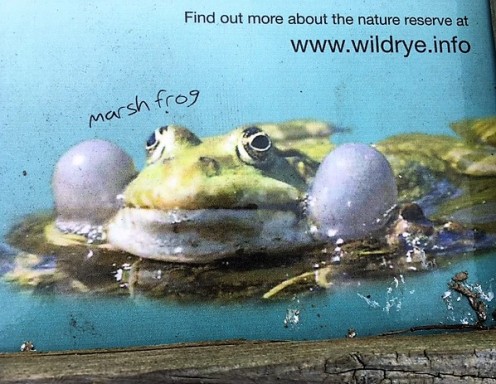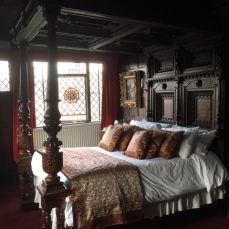
Isn’t this a lovely cadence? How thoughtful of the Environment Agency display at Rye Harbour to phrase a wildlife description so poetically. Sadly, the marshes are contaminated; walkers are advised not to pick the blackberries. But on a cold February day, the marshes did offer chilly walkers stories to keep their interest, displayed by gaunt defensive structures or wooden bird hides.
Rye town itself was bursting with literary references, reminders of a slower but not gentler age, of swashbuckling crime, political favour, and the influence of empire. This is a town of historical heavyweights and royal visits. Ghosts jostle for position, and many of them were writers. Rumer Godden, living after Henry James in Lamb House, claimed to be haunted there by the characters he created in The Turn of the Screw and E F Benson, creator of Mapp and Lucia, also lived in Lamb House but you wouldn’t know it from the plaque outside which references only James; you can do a Mapp and Lucia themed walk through the town which is the model for Tilling and indeed, just as in the books or BBC films, we saw the genteel High Street brought to a standstill by a large vehicle selfishly pursuing its own interests without thought to those of others.
Are you still with me?

I was attempting a homage to James by extending my sentence multiple clauses beyond any memory of how it began, but the master could hold his syntactical nerve longer than I can and already I spot a full stop approaching like a cannonball to stop my train of thought. I was going to add to the ghostly layers by pointing out Joan Aiken, who was born in Rye and is now better known as the author of the fantastic Wolves of Willoughby Chase children’s series, wrote The Haunting of Lamb House (1993), three linked stories featuring James and Benson (who both wrote ghost stories too). Cannonball time again! Notwithstanding, I recently re-encountered Henry James, and it’s worth persevering, though you need a deep breath for some expressions and views we would now find offensive. But the psychology of What Maisie Knew, about a child watching her parents’ marriage implode, is bang up to date. It was reimagined as a film in 2012 and is a compelling watch, along with many other film versions of James’s works (perhaps because someone else has navigated the syntax and distilled the themes and characters). Meanwhile let me point out if you haven’t read Joan Aiken you should stop what you’re doing and hunt her down now whether you have a child to share her books with or not.
The cannons of Rye Castle couldn’t always stop incomers, writers or otherwise. W e were amused to drive through “Rye Foreign” on the outskirts, so called because this harmless looking village once belonged to the French, in the days when the English used to retaliate by swiping parts of Calais when they were off their guard. Rye Foreign it remains, and I’d love to know how the residents voted in the referendum. They must keep a low profile: the locally born barman at our hotel hadn’t heard of Rye Foreign, though there it is, lurking on his very doorstep.
e were amused to drive through “Rye Foreign” on the outskirts, so called because this harmless looking village once belonged to the French, in the days when the English used to retaliate by swiping parts of Calais when they were off their guard. Rye Foreign it remains, and I’d love to know how the residents voted in the referendum. They must keep a low profile: the locally born barman at our hotel hadn’t heard of Rye Foreign, though there it is, lurking on his very doorstep.
Built in the 12th century, rebuilt in the 15th, the Mermaid Inn had stories to tell too. This listed – and listing – building has at least four visible staircases, a warren of beamed rooms, stone fireplaces, a priest’s hole, more hidden staircases, a medieval cesspit (en suite with our room, but we had more modern facilities too), and graffiti and murals dating back centuries. In an exciting twist, proof that Shakespeare acted and may have stayed there was confirmed just this year: receipts show payments to his troupe by the Mayor, and wall paintings within the inn, some restored in the 1920s, appear to reference a performance of Love’s Labour’s Lost. Actors who definitely have stayed there include Dame Judi Dench, and Joanna Lumley among others. It was pleasant to read the history of the inn, sitting in Dr Syn‘s Chamber, which is named after the smuggling Romney Marsh vicar of Russell Thorndike’s novels. (Much odder, to spend time by the roaring fire of the bar, with the most incongruous book I could have thought to bring, The Orchard of Lost Souls by Nadifa Mohamed, which I’m reading for background research for my own novel. This searing story of women living through the Somali civil war of the 1980s did make Mapp and Lucia seem irritating and trivial. But I was in an anti Mapp and Lucia minority, to judge by the chat around me.)
Rye is a good town for pottering. Each cobblestone has its own tea shop, and each tea shop a neighbouring antiques dealer.  I picked up some second hand designer clothes and a jigsaw, to be kept for a reward when the novel’s first draft really is finished. There wasn’t room for us in the Tiny Book Store, and Lamb House was closed until March so we drove on to Bateman’s, 20 miles away, where Rudyard Kipling lived. This was, frankly, disappointing: their collection of Kipling editions was mainly closed and they couldn’t find a copy of the Just So stories whose illustrations I wanted to show my partner. He didn’t have them as a child and what a treat he missed! But there was an exhibition about film versions of The Jungle Book (not only Disney), and gardens that would have been a pleasure to explore but for the drizzle. Hopefully the event below for World Book Day will be more fun – if I lived nearby I’d certainly go.
I picked up some second hand designer clothes and a jigsaw, to be kept for a reward when the novel’s first draft really is finished. There wasn’t room for us in the Tiny Book Store, and Lamb House was closed until March so we drove on to Bateman’s, 20 miles away, where Rudyard Kipling lived. This was, frankly, disappointing: their collection of Kipling editions was mainly closed and they couldn’t find a copy of the Just So stories whose illustrations I wanted to show my partner. He didn’t have them as a child and what a treat he missed! But there was an exhibition about film versions of The Jungle Book (not only Disney), and gardens that would have been a pleasure to explore but for the drizzle. Hopefully the event below for World Book Day will be more fun – if I lived nearby I’d certainly go.
Rye was quite a contrast to my trip last week down Leyton High Road. It was a reminder of UK variety: you can drive for just a couple hours and encounter (or not) a completely different spectrum of classes, races and interests. I’ve returned from chocolate box views to chocabloc traffic, expansive marshland to suburban housing, but each area has as many stories to tell in the unexpected places as in the obvious ones. While I was away more suggestions and responses came in from the helpful network of informants I’ve sourced to authenticate the background to my novel. I think one of the things they’re telling me is: stop swanning around the likes of Rye, Dartington Hall and Stratford-upon-Avon, and get on with that first draft before your young heroine grows grey hair and wrinkles. Otherwise all our generous help will have been for nothing.
© Jessica Norrie 2017






You must be logged in to post a comment.